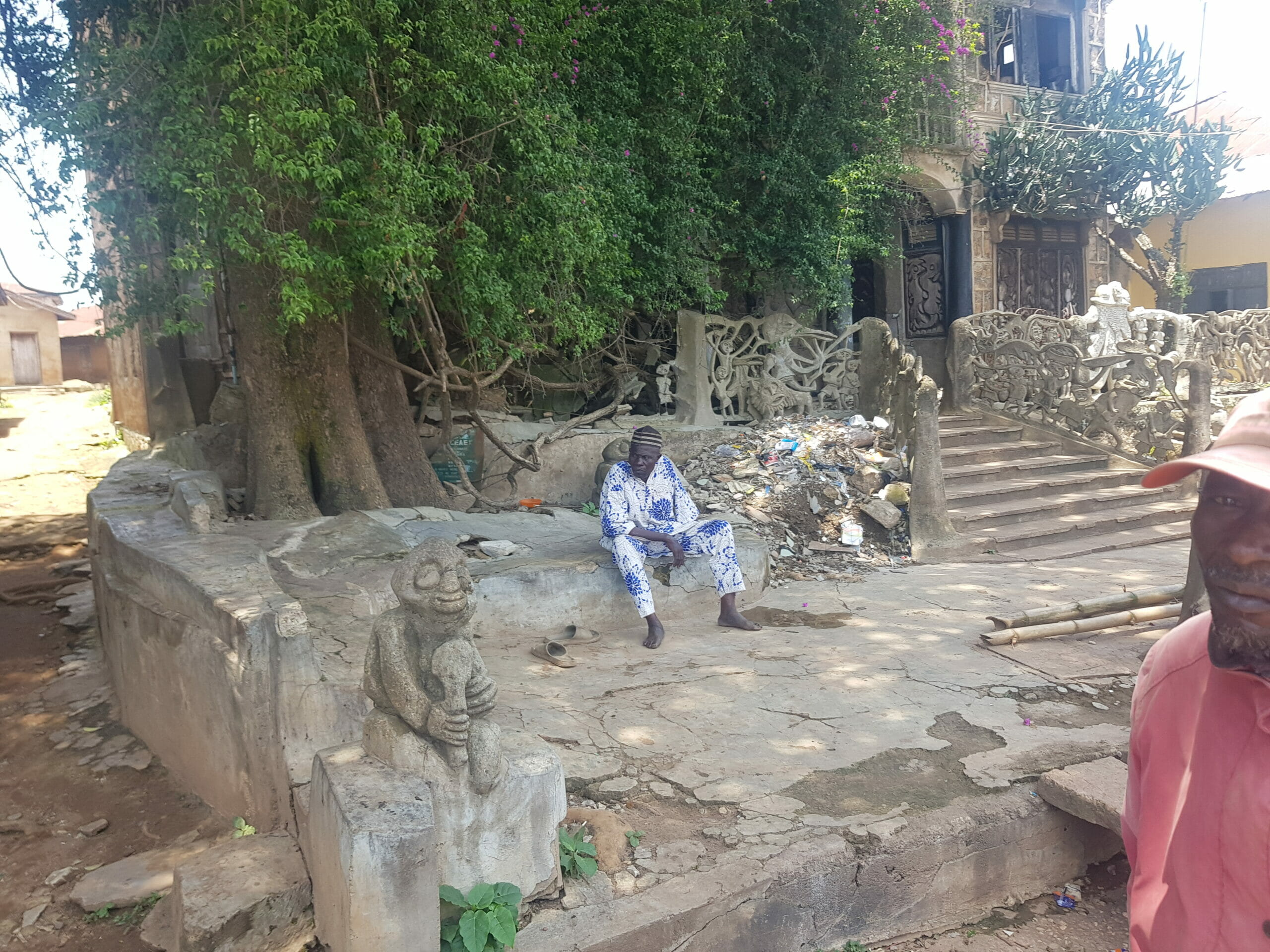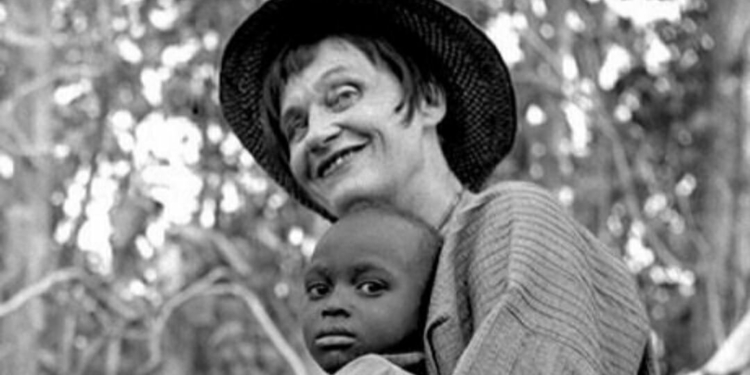Recall that WITHIN NIGERIA in the first part of this report exposed government’s neglect on cultural preserverance especially how the residence of late Austrian-Nigerian artist, Susan Wenger better known as Adunni Olorisha does not befit the status of the woman who spent her entire life making Osun sacred grove a cynosure of all eyes.
In the first part of this report, WITHIN NIGERIA reporter used the word ‘abandoned’ which was misconstrued by some of our esteem readers. This reporter clearly stated that there are new tenants in the three storey building which belongs to the family of Abolubode. ‘Abandoned’ in this regard means that the residence should be renovated and decorated if possible be turned to a monument to befit the status of Austrian-Nigerian artist who laboured for the upliftment of the grove.

The lifetime of Austrian-Nigerian artist, Susan Wenger popularly known as Adunni Olorisha was indeed a revealing one. 12 years after her demise, a lot of people still wonder why someone who worshipped and maintained Osun sacred grove for 50 years died as a barren woman. When elders say ‘a lamp cannot see its base’, it was not an exaggeration. A compilation of past events and a closer look into historical facts of some people referred to as ‘Super humans’ have made it a statement of fact. Indeed, there are some things in this life that are not meant to be understood.
From deities to spirits to natural phenomenon’s, these evidences of nature and spirituality remain puzzles to us. How do one explains cases of some custodians of Aje (God of wealth) who appease for their worshippers to become rich but live in absolute poverty? How do one explains cases of some custodians of Osun (Goddess of fertility) who appease for their worshippers to become fruitful but live without child? Chief Susan Wenger popularly known as Adunni Olorisha, an Austrian-Nigerian artist, illustrator and comics artist who dedicated her life to build Osogbo Sacred Groove and died in 2009 at the age of 93 was no different.
In this reporter’s pursuit to make enquiry into amazing but ‘strange’ lifetime of Chief Susan Wenger better known as Adunni Olorisha, WITHIN NIGERIA visited the ancient town of Osogbo. This reporter had visited the residence of late Susan Wenger which is located along Ibokun road and details of the visit were compiled in the first part of the report.
WITHIN NIGERIA also paid a courtesy visit to Ajaguna of Osogboland, High Chief Gabriel Ojo Oparanti JP. Besides being the head of kingmakers, High Chief Gabriel Ojo is a great historian, very knowledgeable and surprisingly conscious of dates too. This reporter also interviewed some persons who narrated some strange incidents but preferred to be anonymous.

SUSAN WENGER EARLY LIFE
Susan Wenger better known as Adunni Olorisha and fondly addressed as the white princess of Osun was born on 4th July, 1915 during the First World War in Graz, southern Austria. Her parents were English and French high school teacher and high ranking Austro-Hungarian army officer. WITHIN NIGERIA learnt that at an early age, Susan Wenger was drawn to nature and spent most of her time in the woods and mountains of her neighbourhood in her birthplace.
She attended the School of Applied Arts in Graz in 1930, specializing in pottery. She later continued her studies at the Higher Graphical Federal Education and Research Institute. In 1932 to 1935, Wenger also attended the Graphic and Experimental Institute and Visual Art Academy in Vienna.
SUSAN WENGER’S CAREER
Austrian-Nigeria artist, Susan Wenger learned the fresco technique and improved on her drawing skills at the Academy of Fine Arts, Vienna. Wenger was an employee of the communist children’s magazine ‘Unsere Zeitung’ of which she designed the cover of the first edition. Susan Wenger in 1946 to 1950 co-founded the Art club in Vienna; a platform of painters, sculptors, writers and musicians. She won the poster competition of the Italian art club in 1947 and travelled to Rome and Sicily in 1948. After she returned from Italy in 1947, she successfully sold some of her artistic works to an art dealer, Johann Egger who also held works by Hans Arp, Paul Klee and Piet Mondrian.
HOW SUSAN WENGER (ADUNNI OLORISHA) BECAME A PROUD RESIDENT OF OSOGBO
Susanne Wenger better known as Adunni Olorisha and her husband, Ulli Beier travelled to Nigeria and first arrived at the University College Ibadan, Nigeria where her husband had taken up teaching appointment in the Department of Phonetics. When they got to Ibadan, the couple could not stay for long because the new college was at the outskirt of the city and the predominantly British faculty rarely fraternized with their African students. In protest of such development, the couple left Ibadan and moved to the village of Ede.
In a document obtained by WITHIN NIGERIA from High Chief Gabriel Oparanti the Ajaguna of Osogboland, it was revealed that Susan Wenger was later diagnosed with Tuberculosis and traditionally treated in Ede after which she became more spiritual and turned to the Yoruba religion. Susanne Wenger became attracted to the religion after meeting Ajagemo, a priest of Obatala at Ede. Ajagemo introduced Wenger to the Yoruba world view, language and religion, and both individuals later developed a special bond. Susan Wenger had four intensive years of tutelage into the Obatala cult.
In 1956, Susan Wenger left the village of Ede and moved down to Ilobu before she finally settled down in Osogbo where she got interested in the worship of Ogun goddess. Wenger dedicated her time and artistic works to the beautification of Osun-Osogbo grove and become entrenched in the traditional rites and worship of Osun deity.
In 1960, Susan Wenger, her ex-husband Ulli and Georgina organised famous Osogbo Art workshop. This art workshop was the foundation training of some of our notable artists such as Chief Muraina Oyelami, Chief Jimoh Buraimoh, Late Chief Taiwo Olaniyi, Rufus Ogundele, Adebisi Fabunmi, Tijani Mayakiri, Jacob Afolabi and many others.
SUSAN WENGER’S MARITAL LIFE
The white priestess of Osun fondly called Adunni Olorisha met her first husband, Ulli Beier who was a German-Jewish linguist during her holiday in Paris and eventually got married in 1949. The couple moved down to Ibadan, the capital of old Oyo state when the husband, Ulli Beier was offered a position as a phonetics lecturer in the University of Ibadan.
In 1958, Ulli Beier and Susan Wenger officially divorced and their marriage of 9 years ended without a child. In a document obtained by WITHIN NIGERIA, Ulli Beier embarked on intellectual research and development of arts in Nigeria while Susan Wenger intensified her journey into the spiritual depth and knowledge of Traditional Yoruba Religion. Susan’s ex-husband, Ulli Beier eventually married Georgina and the nee couple alongside Susan organised the famous Osogbo Art workshop which reshaped the face of Osun sacred grove and other shrines in Osogbo.
HAVE YOU READ ABOUT CHIEF LASISI ALARAPE?
Chief Lasisi Alarape popularly known as Ayansola Onilu is a traditional drummer. Lasisi Alarape, an Osogbo-born was not just a drummer but the second husband of Austrian-Nigerian artist, Susan Wenger. Chief Alarape and other drummers normally participate in activities such as processions and celebration of deities organised by Susan Wenger.
WITHIN NIGERIA gathered that the first wife of Lasisi Alarape who was also a drummer slumped and died during one of their outings. Chief Lasisi Alarape as at the time he married Susan Wenger was a widower.
Findings revealed that she came from a particular family compound in Osogbo where something strange always descended on them whenever they listen to a particular beat from drums. It was further revealed that she could not control herself when the incident happened. She suddenly slumped and died instantly.
Throughout her stay in Osogbo, Susan Wenger lived in a three-storey building originally leased by her first husband, Chief Ulli Beier. In 1965, Susan Wenger shared the building with her second husband, the drummer Lasisi. Both lived on the first floor while her ex-husband Beier lived on the second floor. It was also gathered that Susan Wenger continued with the lease after Ulli Beier left in 1970. Susan Wenger later divorced Lasisi, the drummer.
OSUN WHITE PRIESTESS WHO DIED A BARREN
Susan Wenger better known as Adunni Olorisha who worshipped Osun, the ‘goddess of fertility’ and maintained her sacred grove for more than 50 years died a barren. The Austrian-Nigerian artist and sculptor married two men namely Ulli Beier and Chief Lasisi Alarape but she never had a child for them.
WITHIN NIGERIA gathered that the Austrian-Nigerian artist, Susan Wenger adopted some sons and daughters of the natives but the most recognised one is ‘Sangodare’, a son of one of the top worshippers of the deity.
Susan Wenger adopted ‘Sangodare’ and raised him alongside other children. Susan Wenger was very hospitable, homely and accommodating when she was alive. The compound of her residence was always filled small children who would leave their various houses to play, joke and dance in her vicinity.
A source told WITHIN NIGERIA that these children and local artists who saw her residence as a ‘Mecca’ would be fed by the Austrian-Nigerian artist.
Osun white priestess, Susan Wenger died in 2009. 12 years after, her memories are still fresh and the lives of many people she impacted are still flourishing and consciously growing. Susan Wenger Trust Fund and foundation are still functioning and doing remarkably well in promoting the late Susan Wenger, upholding her legacy and celebrating her lifetime. Susan Wenger died at the age of 93 and was buried at the Osun sacred groove.








Discussion about this post